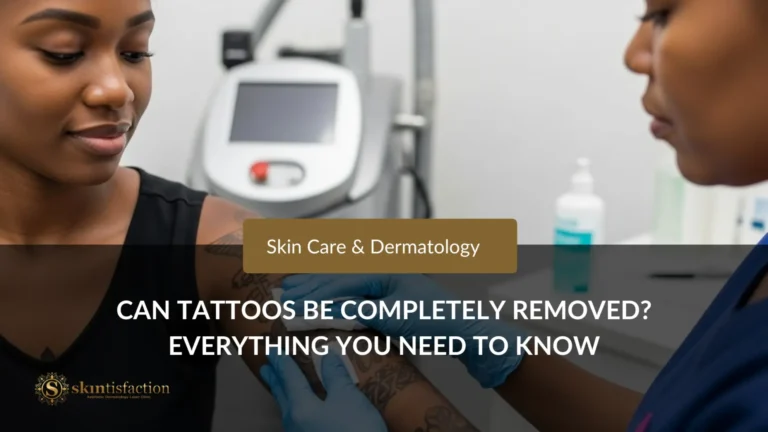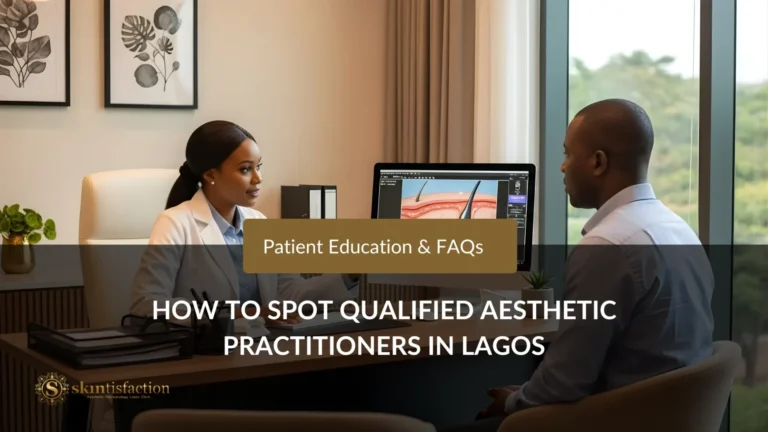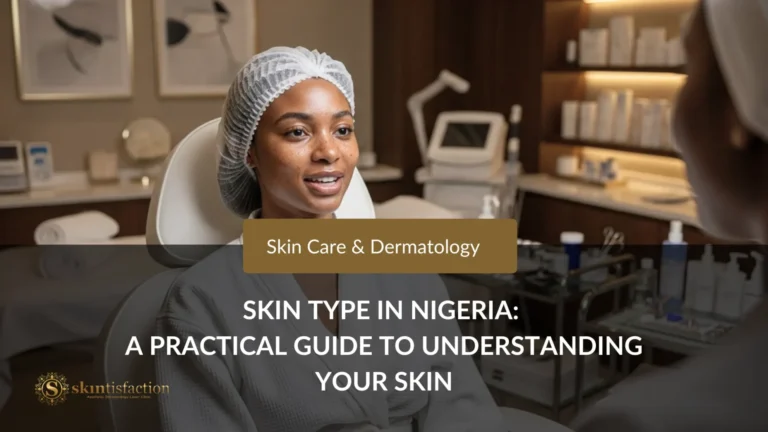If you’ve been dealing with dark spots, uneven skin tone, or stubborn patches of discoloration, you’re not alone. Hyperpigmentation is one of the most common skin concerns we see at Skintisfaction Aesthetic, Dermatology & Laser Clinic, and it’s incredibly frustrating. Between traffic exposure, long commutes, and constant sun, your skin needs more than over-the-counter brighteners.
Here’s the reality: hyperpigmentation treatment in Lagos requires a different approach than what you’ll read about in most beauty blogs. Our tropical climate, intense year-round sun exposure, and the unique characteristics of melanin-rich skin all play a role in how your skin responds to treatment. Understanding what actually works (and what doesn’t) can save you time, money, and disappointment.
Understanding Hyperpigmentation: What’s Actually Happening
Hyperpigmentation occurs when certain areas of your skin produce too much melanin, the pigment that gives skin its color. It’s not dirt, you can’t scrub it away, and it’s not a sign that your skin is unhealthy. It’s just your skin’s melanocytes working overtime in certain spots.
Post-Inflammatory Hyperpigmentation (PIH) is the most common type, especially on melanin-rich skin. Research shows that PIH occurs more frequently and persists longer in darker skin tones. It occurs after any skin trauma—acne, cuts, burns, insect bites, or even aggressive exfoliation. Those dark marks can persist for months or years without proper treatment.
Melasma appears as symmetrical brown patches, typically on the cheeks, forehead, or upper lip. It’s linked to hormonal changes and worsens significantly by sun exposure.
Sun damage accumulates over years of exposure to Lagos’ intense tropical sun, appearing as age spots on the face, hands, and other exposed areas.
Why Lagos Makes Treatment More Challenging
Lagos sits close to the equator, which means strong UV radiation year-round. There’s no “winter break” from the sun. Even on cloudy days, UV rays trigger melanin production, darkening existing spots.
The humidity affects how products sit on your skin. Pollution triggers inflammation, which in turn triggers more pigmentation. Heat rash, mask-related breakouts during commutes, and sweat can all cause minor skin trauma that leads to more PIH.
And while you can find skincare products everywhere, truly effective medical-grade treatments are harder to access. Many products marketed for “lightning” are either ineffective at available concentrations or, worse, potentially harmful.
What DOESN’T Work (Save Your Money)
Lemon juice and DIY remedies can actually make hyperpigmentation worse. They’re unpredictable in strength, can cause chemical burns, and the resulting irritation often leads to more PIH.
Generic “lightening” creams from markets often contain dangerous ingredients like mercury or steroids. These can cause permanent skin damage, including a type of darkening that’s extremely difficult to treat.
Aggressive scrubbing creates trauma that triggers more melanin production. This is one of the most common mistakes – people rubbing their skin raw trying to remove dark spots, only to make them worse.
Random product combinations without professional guidance can irritate your skin and worsen pigmentation. What worked for your friend might not work for you. Professional assessment is essential.
Professional Options for Hyperpigmentation Treatment in Lagos
Medical-Grade Topical Treatments
The foundation of any treatment plan should be prescription-strength topicals that work at the cellular level to reduce melanin production and increase cell turnover.
Hydroquinone (4%+) remains the gold standard under medical supervision. Tretinoin accelerates cell turnover, fades dark spots, and improves texture. Azelaic acid, tranexamic acid, niacinamide, and vitamin C help inhibit excess pigment and calm inflammation. Medical-grade formulations use effective concentrations, stable pH, and vehicles that actually penetrate the skin.
The difference between over-the-counter products and medical-grade formulations is significant. Professional products have the right concentrations, proper pH levels, and stable formulations that actually penetrate skin effectively.
Chemical Peels
Chemical peels are among our most effective tools for treating hyperpigmentation in darker skin tones when performed by experienced dermatologists.
They use controlled exfoliation to remove damaged surface layers and stimulate new cell growth. A series of 4-6 treatments spaced 3-4 weeks apart is typically recommended. Most patients see visible improvement after the second or third treatment.
Critical safety note: Chemical peels on melanin-rich skin must be performed by professionals who understand the unique needs of darker skin tones. Improper technique can cause more hyperpigmentation, which is why we always start conservatively.
Laser Treatments
Not all lasers are safe for melanin-rich skin. At Skintisfaction, we follow international guidelines for treating skin of color and use only lasers proven safe and effective for darker skin tones.
Q-Switched lasers target melanin with very short pulses of light, breaking up pigment so your body can naturally clear it away. Fractional lasers trigger skin renewal and collagen production, working on multiple levels to improve both pigmentation and texture. We use platforms proven safe for melanin-rich skin and avoid or carefully screen IPL for darker skin types to minimize PIH risk.
Laser treatments produce faster results than topicals alone and can treat deeper pigmentation. However, laser treatments on melanin-rich skin absolutely require expertise – improper settings can cause permanent pigmentation changes.
Individual results vary based on skin type, pigmentation depth, and adherence to aftercare.
Microneedling and HydraFacial
Microneedling creates controlled micro-injuries that trigger your skin’s repair mechanisms and allow deeper penetration of brightening serums. When combined with vitamin C or growth factor serums, it’s particularly effective.
HydraFacial treatments offer deep cleansing and targeted serum infusion with no downtime. They’re excellent for maintaining results and preventing new pigmentation between more intensive treatments.
Not sure which option fits your skin? Book a pigmentation assessment to get a custom plan from our dermatologists.
The Skintisfaction Approach
At Skintisfaction, we don’t believe in one-size-fits-all protocols. Your treatment starts with a thorough assessment, during which we identify the type and cause of your pigmentation, evaluate your skin’s condition and sensitivity, and consider your lifestyle and environmental factors.
Dr. Uzo Iloabachie has specialized training in treating melanin-rich skin. This expertise is crucial because protocols that work for lighter skin tones can cause serious problems on darker skin. We understand the specific risks and adjust treatments accordingly, following evidence-based protocols from leading organizations such as the American Academy of Dermatology, adapted for our patient population and the Lagos environment.
We create customized treatment plans that typically combine professional treatments with at-home care. This phased approach allows us to see how your skin responds and adjust as needed – intensifying treatment if your skin tolerates it well, or pulling back if we see any signs of irritation.
Essential At-Home Care
Professional treatments are essential, but what you do at home every day is equally important.
Morning routine: Gentle cleanser, vitamin C serum (if prescribed), moisturizer, and broad-spectrum SPF 50+ sunscreen. This last step is non-negotiable – reapply every 2-3 hours if you’re outdoors.
Evening routine: Gentle cleanser, prescription treatments (such as hydroquinone or tretinoin), moisturizer, and barrier-repair cream, if needed.
Sun protection in Lagos deserves special emphasis: Apply sunscreen 15-20 minutes before going outside. Reapply every 2-3 hours, especially when sweating. Use physical barriers, such as hats and umbrellas. Remember that UV rays penetrate car windows – protect your hands while driving.
All medical-grade skincare products are available at Skintisfaction to ensure you’re using formulations that work with your treatment plan.
Results and Maintenance: What to Expect
Timelines matter: With combined professional and topical treatments, most patients notice visible improvement within 4-8 weeks. Optimal results usually appear around the 3-4 month mark. Topicals alone take longer – expect 8-12 weeks before seeing initial changes.
Realistic expectations: Success means gradual lightening of dark spots, more even overall skin tone, and reduced visibility of pigmentation. The goal isn’t to become several shades lighter, but to achieve healthier, more even-toned skin where your natural complexion shines through.
Prevention is simpler than treatment: Daily sunscreen use is the single most effective way to prevent hyperpigmentation from worsening. Treat skin trauma promptly – whether it’s acne, cuts, or insect bites. Regular dermatology consultations (every 3-6 months) and professional maintenance treatments (2-4 times per year) help keep results lasting.
Your skin’s appearance is also influenced by stress management, adequate sleep, and a healthy diet. Talk to our clinical nutritionists about skin-supporting nutrition plans.
Cost Considerations
Treatment costs in Lagos vary based on the type of treatment and severity of your hyperpigmentation. Topical prescriptions are typically the most affordable starting point. Chemical peels are a mid-range investment, while laser treatments have higher initial costs but often produce faster results. We offer package deals that provide the best value for comprehensive treatment plans.
Contact our clinic during your consultation for detailed pricing information tailored to your specific treatment plan.
Here’s why professional treatment is worth it: you stop wasting money on products that don’t work. You avoid complications that cost more to fix. You get results in months, not years of trial and error. And you have medical supervision for safety.
Frequently Asked Questions
Ready for Clearer, Even-Toned Skin?
Hyperpigmentation is frustrating, but it’s treatable. The difference between continued frustration and real results comes down to working with professionals who understand melanin-rich skin.
At Skintisfaction, we’ve helped hundreds of patients in Lagos achieve significantly clearer, more even-toned skin through evidence-based treatments and personalized care.
Book your hyperpigmentation consultation or call us at (+234)90-800-07546 to discuss your treatment options.
Located in Lekki with proven expertise in treating melanin-rich skin safely and effectively.






